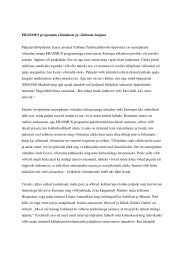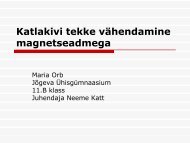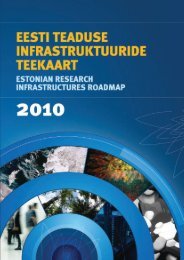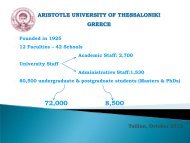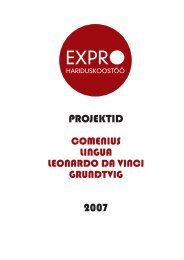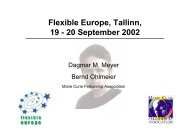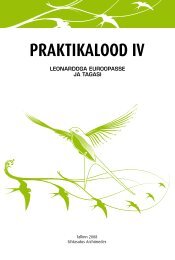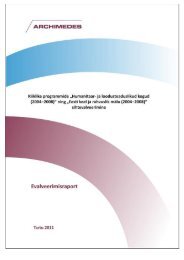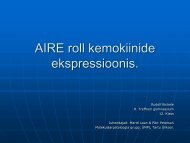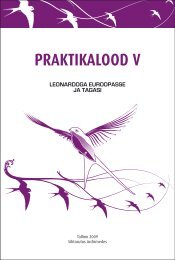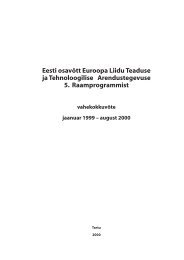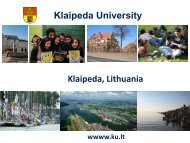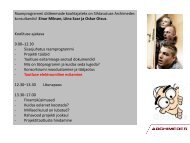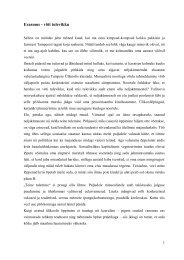Grundtvig - Archimedes
Grundtvig - Archimedes
Grundtvig - Archimedes
Create successful ePaper yourself
Turn your PDF publications into a flip-book with our unique Google optimized e-Paper software.
The content of the workshop will be divided between visits, times for the theoretical learning, times<br />
to think individually or in group, times to work in a concrete way in team through a precise<br />
technical support and times to resituate. The participants will be invited to come with visual<br />
element of dry stone building from their country which will allow to exchange about the different<br />
techniques and use of the dry stone. The participants can come ideally with an idea of realisation<br />
(renovation or creation). - Theoretical benefits: analysis of the build and reading rudiments of the<br />
site (diagnostic, materials, role and functions), on the basis of the elements brought from the<br />
participants, the technical support from the workshop and depending on their knowledge; -<br />
Introduction to the basic "dry stone" build techniques and integration of the build in its<br />
environment; - Visits of different regional areas to make aware of the diversity of dry stone<br />
buildings, their functionality, their integration in the landscape or the notion of a collective project<br />
related to. - Creation of educational tools (multilingual glossary, "catalogue" of the dry stone in<br />
Europe) intended to improve exchanges between the learners and to enrich their personal project or<br />
their look related to the "dry stone" build; - Setting up of the educational project of the association<br />
among the group of learners; - Nonstop evaluation of the learning and practices through individual<br />
forms.<br />
15 / 04 / 2012 Host and prepare the learners • Hosting of the participants, • Presentation of the<br />
training, • Pooling of the personal expectations, • Organisation of the collective life, • Simulation<br />
exercise of the organisation of the collective life during this training; • Hosting by the mayor of the<br />
city.<br />
16 / 04 / 2012 Share and create a context of knowledge Analysis of the build and reading<br />
rudiments of the site (diagnostic, materials, role and functions) • Visit of the site where the<br />
technical intervention will take place (in the city): understanding of the technical purpose (nature,<br />
function) and integration in its environment. • Exchanges and comparison in a European dimension<br />
of the level of knowledge of each learner, work on the elements brought, draft of an European<br />
"catalogue" of dry stone build • Work in small groups on the notion of voluntary work in the<br />
countries of the participants, pursuit of synergies, and analysis of the differences between the<br />
countries. • Exchanges on the words used, draft of a multilingual guide of the dry stone. •<br />
Understand a technical item: form, role and state, concretise the idea a technical renovation project<br />
17 / 04 / 2012 Introduction to the "dry stone" building, learning practical skills Learning<br />
knowledge related to the thematic • Team work on a technical site: set up a building site, secure<br />
the site, plan the logistic, and the materials • Introduction to the basic techniques. • Theoretical<br />
presentation of the advantages of dry stone building (technical, hydraulic, ecological, environmental<br />
and related to the heritage, maintain and transfer the esthetical know-how and the quality of life<br />
18 / 04 / 2012 Technical introduction to the "dry stone" building, learning of practical skills<br />
Bring the notion of a collective project in the field Enhancement of the learning and exchanges<br />
between the learners • Team work on a technical site: set up a building site, secure the site, plan<br />
the logistic, and the materials • Introduction to the basic techniques. • Analysis of the leader<br />
posture, group management, follow-up of the works. • Evaluation of the previous afternoon, work<br />
on the teaching aids.<br />
19 / 04 / 2012 Raising awareness to the diversity of buildings, replace the thematic in a landscaped<br />
and cultural context, Evaluation • Visits of sites in the Auvergne region, reading of landscapes,<br />
integration of the dry stone heritage in the environment. Visit of a collective project (the friends of<br />
Léontoing in Haute-Loire) • Participants' feedbacks and accounts about the day. Begin the idea of<br />
carrying out collective projects.<br />
20 / 04 / 2012 Give elements to allow a collective action • Accompany the participants in a step<br />
to implement collective projects related to the heritage. • Exchanges about the practices of<br />
collective work in the different countries (voluntarism, citizenship). • Work in groups about the<br />
potential projects of the participants. • Project methodology on how implementing workcamps for<br />
volunteers.<br />
165



